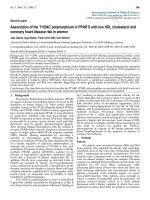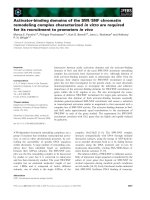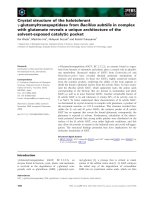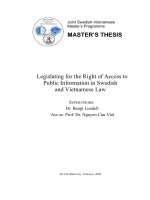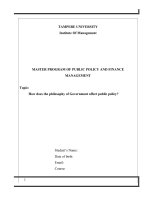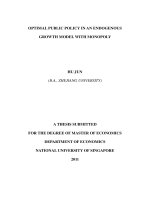The three sector solution delivering public policy in collaboration with not for profits and business
Bạn đang xem bản rút gọn của tài liệu. Xem và tải ngay bản đầy đủ của tài liệu tại đây (1.63 MB, 406 trang )
THE THREE SECTOR
SOLUTION
Delivering public policy in collaboration
with not-for-profits and business
EDITED BY JOHN R. BUTCHER
AND DAVID J. GILCHRIST
Published by ANU Press
The Australian National University
Acton ACT 2601, Australia
Email:
This title is also available online at press.anu.edu.au
National Library of Australia Cataloguing-in-Publication entry
Title:
The three sector solution : delivering public policy in
collaboration with not-for-profits and
business / David Gilchrist (editor) ;
John Butcher (editor).
ISBN:
9781760460389 (paperback) 9781760460396 (ebook)
Series:
ANZSOG series.
Subjects:
Nonprofit organizations--Political aspects.
Nonprofit organizations--Government policy.
Public-private sector cooperation--Government policy.
Public administration.
Other Creators/Contributors:
Gilchrist, David, editor.
Butcher, John, editor.
Australia and New Zealand School of Government.
Dewey Number:
361.763
All rights reserved. No part of this publication may be reproduced, stored in a
retrieval system or transmitted in any form or by any means, electronic, mechanical,
photocopying or otherwise, without the prior permission of the publisher.
Cover design and layout by ANU Press.
This edition © 2016 ANU Press
Contents
Figures. . . . . . . . . . . . . . . . . . . . . . . . . . . . . . . . . . . . . . . . . . . . . . . . . . . . vii
Tables. . . . . . . . . . . . . . . . . . . . . . . . . . . . . . . . . . . . . . . . . . . . . . . . . . . . . ix
Abbreviations. . . . . . . . . . . . . . . . . . . . . . . . . . . . . . . . . . . . . . . . . . . . . . . xi
Acknowledgements . . . . . . . . . . . . . . . . . . . . . . . . . . . . . . . . . . . . . . . . . xv
Contributors. . . . . . . . . . . . . . . . . . . . . . . . . . . . . . . . . . . . . . . . . . . . . . . xvii
Foreword. . . . . . . . . . . . . . . . . . . . . . . . . . . . . . . . . . . . . . . . . . . . . . . . xxvii
Contextualising the Imperative of Cross‑Sector Working
1.
Introduction. . . . . . . . . . . . . . . . . . . . . . . . . . . . . . . . . . . . . . . . . . . . 3
2.
Three Sectors, One Public Purpose. . . . . . . . . . . . . . . . . . . . . . . . . 23
David J. Gilchrist and John R. Butcher
Peter Shergold
Part 1. Cross-Sector Working: The rhetoric and the reality
Overview . . . . . . . . . . . . . . . . . . . . . . . . . . . . . . . . . . . . . . . . . . . . . . . . . 35
Meredith Edwards
3.
4.
5.
From New Public Management to New Public Governance:
The implications for a ‘new public service’ . . . . . . . . . . . . . . . . . . . .41
Helen Dickinson
Partnerships between Government and the Third Sector at a
Subnational Level: The experience of an Australian subnational
government. . . . . . . . . . . . . . . . . . . . . . . . . . . . . . . . . . . . . . . . . . . 61
David J. Gilchrist
The Contribution of Not-for-Profits to Democratic Process. . . . . . . . 79
Tessa Boyd-Caine
Part 2. Three Sectors: Three change agendas
Overview . . . . . . . . . . . . . . . . . . . . . . . . . . . . . . . . . . . . . . . . . . . . . . . . 107
Penny Knight
6.
Policy Impediments to Social Investments by Australian
Businesses . . . . . . . . . . . . . . . . . . . . . . . . . . . . . . . . . . . . . . . . . . 113
Leeora D. Black
7.
8.
Navigating Reform in Contested Spaces: Reflections on
not-for-profit sector regulatory reform in Australia, 2010–2013. . . . 131
Krystian Seibert
Shining a Light on the Black Box of Collaboration:
Mapping the prerequisites for cross‑sector working. . . . . . . . . . . . 157
Robyn Keast
Part 3. Great Expectations: Outcomes and social impact
Overview . . . . . . . . . . . . . . . . . . . . . . . . . . . . . . . . . . . . . . . . . . . . . . . . 181
Nina Terrey
9.
Does Outcomes-Based Reporting Contribute to or Contradict
the Realisation of Social Outcomes? . . . . . . . . . . . . . . . . . . . . . . . 185
Emma Tomkinson
10. Not-for-Profit Accountability: Addressing potential barriers. . . . . . . 215
Dale Tweedie
11. Results, Targets and Measures to Drive Collaboration:
Lessons from the New Zealand Better Public Services reforms . . . 235
Rodney Scott and Ross Boyd
Part 4. New Tools for Policymakers and Practitioners
Overview . . . . . . . . . . . . . . . . . . . . . . . . . . . . . . . . . . . . . . . . . . . . . . . . 261
Ursula Stephens
12. Redesigning Procurement Strategies for Complex Policy Spaces. . . 265
Ann Nevile
13. Alliance Contracting: How to progress in a world of uncertainty. . . 285
Cassandra Wilkinson
14. Expanding the Role of Cooperative and Mutual Enterprises
in Delivering Public Services: Disrupting the status quo . . . . . . . . . 301
Melina Morrison and Cliff Mills
15. The Boundaries of Budgets: Why should individuals make
spending choices about their health and social care?. . . . . . . . . . . 319
Catherine Needham
Cross-Sector Working: Meeting the challenge of change
16. The Challenge of Change. . . . . . . . . . . . . . . . . . . . . . . . . . . . . . . . 337
Paul Ronalds
17. Conclusion. . . . . . . . . . . . . . . . . . . . . . . . . . . . . . . . . . . . . . . . . . . 353
John R. Butcher and David J. Gilchrist
Figures
Figure 8.1: Continuum of interorganisational relationships:
The five Cs. . . . . . . . . . . . . . . . . . . . . . . . . . . . . . . . . . . . . . . 159
Figure 9.1: The changing role of government. . . . . . . . . . . . . . . . . 187
Figure 9.2: Changing expectations of government . . . . . . . . . . . . . 189
Figure 9.3: Red tape issues for NGOs . . . . . . . . . . . . . . . . . . . . . . . 193
Figure 9.4: The impact analysis cycle. . . . . . . . . . . . . . . . . . . . . . . 204
Figure 11.1: Stylised representation of performance management
in the New Zealand Government . . . . . . . . . . . . . . . . . . . . . . 237
vii
Tables
Table 3.1: Elements of new public governance, in contrast with
public administration and new public management. . . . . . . . . 44
Table 4.1: Year-on-year response rates . . . . . . . . . . . . . . . . . . . . . . . 68
Table 7.1: Chronology of the ACNC reform process . . . . . . . . . . . . 141
Table 8.1: Summary of the key presenting processes used . . . . . . . 164
Table A8.1: Summary of collaboration exemplars. . . . . . . . . . . . . . 178
Table 9.1: Job Services Australia star rating and star percentages. . . 200
Table 11.1: Results, targets and measures. . . . . . . . . . . . . . . . . . . . 239
ix
Abbreviations
ABS
ACAG
ACNC
ACOSS
ACT
ACTU
ANAO
ANDI
ANZSOG
APS
ARC
ASX
ATO
ATSI
BCCM
BPS
C4C
CAD
CBA
CDC
CEO
COAG
CPSU
CRN
CSCI
Australian Bureau of Statistics
Australasian Council of Auditors-General
Australian Charities and Not-for-profits Commission
Australian Council of Social Service
Australian Capital Territory
Australian Council of Trade Unions
Australian National Audit Office
Australian National Development Index
Australia and New Zealand School of Government
Australian Public Service
Australian Research Council
Australian Securities Exchange
Australian Taxation Office
Aboriginal and Torres Strait Islander
Business Council of Co-operatives and Mutuals
Better Public Services (NZ)
Communities for Children
computer-aided design
cost–benefit analysis
consumer-directed care
chief executive officer
Council of Australian Governments
Community and Public Sector Union
Collaborative Research Network
Commission for Social Care Inspection (UK)
xi
The Three Sector Solution
CSD
CSI
CSR
DCSP
DES
DGR
EHRC
ESA
FYN
GDP
GST
IBSEN
ICA
IYC
KPI
LHA
LNP
ML
MOU
NAB
NCEA
NCSMC
NDIS
NFP
NGO
NHS
NPC
NPG
NPM
NSW
NZQF
OECD
PAF
xii
Community Services Directorate (ACT)
corporate social investment
corporate social responsibility
Delivering Community Services in Partnership
disability employment services
deductible gift recipient
Equality and Human Rights Commission (UK)
employment service area
Family and Youth Network
gross domestic product
Goods and Services Tax
Individual Budgets Evaluation Network
International Co-operative Alliance
United Nations International Year of Cooperatives
key performance indicator
Local Housing Allowance (UK)
Liberal National Party
Medicare Local
memorandum of understanding
National Australia Bank
National Certificate of Educational Achievement
National Council for Single Mothers and their Children
National Disability Insurance Scheme
not-for-profit
non-governmental organisation
National Health Service (UK)
New Philanthropy Capital
new public governance
new public management
New South Wales
New Zealand Qualifications Framework
Organisation for Economic Co-operation and Development
private ancillary fund
Abbreviations
PHN
PSP
R&D
SA
SBB
SHS
SIP
UBIT
UK
WA
YWCA
Primary Health Network
preferred service provider
research and development
South Australia
social benefit bond
Specialist Homelessness Services
Services Integration Project
unrelated business income tax
United Kingdom
Western Australia
Young Women’s Christian Association
xiii
Acknowledgements
The editors would like to thank the Dean of the Australia and New
Zealand School of Government (ANZSOG), Professor Gary Banks AO,
for his support and encouragement. The editors are grateful, too, for
the generous financial support provided by Professor John Wanna,
Sir John Bunting Chair of Public Administration at The Australian
National University, and the Curtin Not-for-Profit Initiative, Curtin
University.
We also wish to thank the ACT Government’s Community Service
Directorate for generously meeting the costs of recording the workshop,
and cameraman Martin Helmreich for his capable videorecording
and post-production work. With regard to the organisation of the
workshop, the editors are indebted to Professor Wanna’s executive
assistant, Claire Dixon; Jamie Kidson and the multimedia team at
The Australian National University; and to Jacqui Burkitt, Nicole
Mallick and Susie Bate from ANZSOG’s marketing team for their
invaluable practical assistance.
Thanks go also to Isi Unikowski for pitching in to help at the workshop,
as well as to Sam Vincent for shepherding the manuscript through the
prepublication process, Jan Borrie for her usual astute and meticulous
copyediting and the team at ANU Press.
Of course, neither the workshop nor this book would have been
possible without the generous and enthusiastic commitment of the
authors and presenters, the discussants and the session chairs. The last
deserve special mention as they are not named elsewhere: Professor
Andrew Podger, The Australian National University; Dr Alison Procter,
ACT Community Services Directorate; and David Casey, Department
of the Prime Minister and Cabinet.
xv
The Three Sector Solution
Special thanks go to Natalie Howson, former director-general of
the ACT Community Services Directorate, and Simon Rosenberg,
CEO of Northside Community Service, for setting the scene in their
remarks to the pre-workshop dinner. And, of course, the editors are
grateful for the enthusiasm shown by the workshop audience, who
remained vitally engaged in the conversation throughout a packed
and intellectually demanding day.
xvi
Contributors
Dr Leeora Black
Dr Leeora Black is Director of the Australian Centre for Corporate
Social Responsibility and a leading authority on corporate social
responsibility (CSR). Her work focuses on building competitive
advantage and stakeholder wealth through CSR, integrating social
responsibility into business operations and strategies and solving
complex CSR issues and problems. Leeora works with listed companies,
government businesses and social sector organisations providing
services such as framework and strategy development, stakeholder
research and engagement, reporting and executive learning programs.
Her doctoral thesis on corporate social responsiveness pioneered
a framework and methodology for developing and assessing
management capabilities in the area of CSR.
Ross Boyd
Ross Boyd (BA Hons, NZTC, MEdAdmin) is a principal analyst in the
State Sector Performance Hub, based in the State Services Commission,
Wellington, New Zealand. Ross leads the Better Public Services (BPS)
Results work stream. He has taken the BPS Results work from policy
design in 2011 through implementation during 2012 and now monitors
and reports on progress. He is currently leading a refreshment of the
program so that it aligns with current and emerging policy initiatives,
particularly the investment approach to social policy. Ross has spent
the past nine years working in central agencies, starting with the
Department of the Prime Minister and Cabinet’s Policy Advisory Group;
moving to the State Services Commission, where he was the manager
responsible for introducing New Zealand’s Performance Improvement
Framework; then joining central agency teams responsible for the
xvii
The Three Sector Solution
policy and implementation of State sector reform. Before his central
agency work, Ross held several operational and policy management
roles at the Ministry of Education.
Dr Tessa Boyd-Caine
At the time of writing her chapter, Tessa was Deputy CEO at the
Australian Council of Social Service. She is now CEO of the National
Centre for Health Justice Partnership. Tessa was recipient of the
inaugural 2013 Fulbright Professional Scholarship in Non-Profit
Leadership, through which she examined how American philanthropic
and charitable organisations develop transparency and accountability.
In the United States, she worked with the Foundation Center in New
York City and the Urban Institute in Washington, DC, and visited
not-for-profit charitable and philanthropic organisations across the
country. Tessa has participated extensively in policy processes with
government, the community sector and the business community. She
has also worked in the areas of human rights, mental health law and
criminal justice, in Australia and internationally. Tessa’s PhD from the
London School of Economics examined the role of executive discretion
and the public protection agenda in decisions about the release
of mentally disordered offenders. Her book Protecting the Public?
Detention and release of mentally disordered offenders was published by
Routledge in 2010.
Dr John Butcher
Dr John Butcher earned his PhD at The Australian National University
in 2014. He also has an MA and BA from the University of British
Columbia. John has a long-standing interest in the impact of
government policy on the not-for-profit sector and has worked at the
front line of policy reform for two levels of government. Currently
an adjunct researcher at The Australian National University, he is coauthor of Policy in Action (UNSW Press) and has published widely on
not-for-profit policy.
Associate Professor Helen Dickinson
Associate Professor Helen Dickinson was educated at the universities
of Manchester and Birmingham in the United Kingdom. Helen joined
the University of Melbourne in 2013 as Associate Professor in Public
Governance. She has published widely on topics such as governance,
xviii
Contributors
leadership, organisational behaviour and rationing in journals such as
Public Administration, Public Management Review, Social Science and
Medicine and Evidence and Policy. Helen has authored, co-authored
or edited 16 books on topics such as governance, leadership and the
reform of health care. She is also a co-editor of the Australian Journal
of Public Administration.
Professor Meredith Edwards
Professor Meredith Edwards AM is Emeritus Professor at the Institute
for Governance and Policy Analysis at the University of Canberra. She
was deputy vice-chancellor from 1997 at that university and director
of its National Institute for Governance until 2004. Before joining the
University of Canberra, Meredith was a senior policy adviser in the
Australian Public Service involved in a range of major social policy
reforms across several departments from 1983 to 1993, and deputy
secretary in the Department of the Prime Minister and Cabinet until
1997. An economist, a Fellow of the Institute of Public Administration
Australia, ANZSOG Fellow, and Fellow of the Academy of Social
Science in Australia (ASSA), in 2001 Meredith published a book
on policy development processes, Social Policy, Public Policy: From
problem to practice. In 2012 she co-authored Public Sector Governance
in Australia and in 2015 co‑authored Not Yet 50/50: The barriers to
the progress of senior women in the APS. Meredith is a member of the
United Nations Committee of Experts on Public Administration.
Professor David J. Gilchrist
Professor David J. Gilchrist has held a number of senior roles in the
not-for-profit, public and commercial sectors. Most recently, he was
Assistant Auditor General Standards and Quality in Western Australia,
and prior to that, Associate Dean of Business at the University of
Notre Dame Australia. He is currently Director of Curtin’s School of
Accounting Not-for-profit Initiative, a research group focusing on
developing industry-ready research outcomes for the not-for-profit
and charitable sector. He currently holds a number of industry roles
including as chairman of Nulsen Disability Services, chairman of the
Kimberley Individual and Family Support Association and is a member
of Chartered Accountants Australia and New Zealand’s National
Not-for-profit Advisory Committee. David is also a member of the
Australian Charities and Not-for-profits Commission Advisory Board,
xix
The Three Sector Solution
the Australian Accounting Standards Board Academic Advisory Panel
and is a joint principal author of a number of key national reports,
including the seminal report Australian Charities 2013 and the
Australian National Costing and Pricing Framework issued jointly with
National Disability Services. He has published widely as an academic
and journalist.
Professor Robyn Keast
Professor Robyn Keast is a research professor in the School of
Business and Tourism at Southern Cross University and Chair of the
Collaborative Research Network: Policy and Planning for Regional
Sustainability. Her research is focused on networked arrangements
and collaborative practices within and across sectors. A current
research focus is on the management and impact of collaborative
research networks and the development of sociocultural approaches
to client-centred networked service systems. She recently co-authored
three books Negotiating the Business Environment: Theory and practice
for all governance styles, Network Theory in the Public Sector: Building
new theoretical frameworks, and Social Procurement in New Public
Governance (Routledge) and has developed several network tools for
service practitioners, including 15 fact sheets on collaborative practice
and a collaboration decision support tool. Robyn also has an extensive
background as a practitioner, policy officer and senior manager within
the Queensland public sector. This work experience has also extended
to the non-governmental sector in Queensland, New Zealand and
Canada. She also established and directed a prominent departmental
research unit that provided evaluation and analysis of service
interventions and emergent issues as well as the external review of
critical incidents within related departments and across the sector.
Penny Knight
Penny Knight is a Senior Research Fellow with the Curtin Business
School and Research Director for the Curtin Not-for-profit Initiative.
She has worked for Western Australia’s Department of Treasury
undertaking sector and program evaluations and leading the evaluation
and improvement of the government’s outcomes-based management
structure; she has co-founded and run an internet business; and has
worked as a consultant for PriceWaterhouseCoopers and KPMG on
xx
Contributors
diverse projects including whole-of-government reform, improving
service delivery and efficiency, developing a customer service culture
and change management.
Cliff Mills
Cliff Mills is a solicitor in the United Kingdom and a leading expert
in the law and governance of cooperative, mutual and memberbased organisations, with more than 20 years’ experience writing
constitutions and advising on mergers and governance. Since the
late 1990s, he has been extensively involved in public sector reform,
designing new mutual ownership and governance structures as a
means of establishing a directly accountable, citizen-based approach
to modern public ownership. Based on a multi-constituency approach
involving users, employees and citizens, he has established new
mutual organisations in health care (including National Health Service
Foundation Trusts), social housing, leisure services and youth services.
Cliff has been much involved in the development of cooperative and
community benefit society law in the United Kingdom since 2000,
working with Members of Parliament on private members’ bills
and supporting government-sponsored legislation. He has written
extensively about cooperative and mutual ideas and concepts through
the mutual consultancy Mutuo, and is one of the joint authors of the
Blueprint for a Cooperative Decade.
Melina Morrison
Melina Morrison is the inaugural CEO of Australia’s first peak body
for co-operatives and mutuals, the Business Council of Co-operatives
and Mutuals. She is an advocate for all forms of mutually owned
enterprise, regularly contributing commentary and appearing as
a spokesperson for the sector. Melina has commissioned, edited
and co-written the sector’s first national mapping reports. Melina’s
former roles in the co‑operative sector include five years as editor
of ICA Digest, the flagship publication for the global peak body, the
International Co-operative Alliance (ICA). Melina wrote the message
platform for the ICA’s global strategy, Blueprint for a Co-operative
Decade. Her advocacy work for the sector resulted in Australia minting
a coin commemorating the International Year of Co-operatives in 2012.
xxi
The Three Sector Solution
Melina was also successful in lobbying for a Senate inquiry into the
co-operative and mutual business sector, which handed down its
report on the 17 March 2016.
Dr Ann Nevile
Dr Ann Nevile is a social policy researcher at The Australian National
University. A major focus of Ann’s research is the impact of funding
and performance frameworks on third-sector service delivery agencies
and their clients, most recently in the area of disability employment,
where she has been lead chief investigator and sole chief investigator
in two Australian Research Council-funded Linkage projects. A
second strand of Ann’s research is focused on values—in particular,
identifying differences and similarities in the values held by service
providers and policy elites and what those with experience of poverty
value. Her research on values led to an edited book on human rights
and social policy that explored the links between international and
European Union human rights frameworks and service delivery on
the ground.
Dr Catherine Needham
Dr Catherine Needham is a Reader in Public Policy and Public
Management at the Health Services Management Centre, University
of Birmingham. Her areas of special interest include reform of public
services through coproduction and personalisation, social care
services, individualised budgets within public services and public
sector workforce reform. She has published a wide range of articles,
chapters and books for academic and practitioner audiences, many
of them focused on social care and individualised funding schemes.
Her most recent book, Debates in Personalisation, was published by
the Policy Press in 2014. Her current projects include an evaluation
of microenterprises in social care and a knowledge exchange project
on the twenty-first-century public servant in partnership with
Birmingham City Council. She tweets as @DrCNeedham.
Paul Ronalds
Paul Ronalds is the CEO of Save the Children Australia. Before joining
Save the Children, Paul held senior executive roles in government,
domestic and international non-profits and the private sector. In
xxii
Contributors
particular, Paul had responsibility for implementing the Gillard
Government’s not-for-profit reform and social inclusion agendas and
led the establishment of the first national-level Office for the Not-forProfit Sector in Australia. In the non-profit sector, Paul worked for
World Vision Australia as deputy CEO and director of strategy, and
as chief operating officer of Urban Seed, an innovative and dynamic
non-profit that provides a range of services to marginalised people
in inner-city Melbourne. Paul holds degrees in economics and law
(with honours) from Monash University and a master’s degree in
International Relations from Deakin University. He is the author of
The Change Imperative: Creating a next generation international nongovernment organisation.
Dr Rodney Scott
Dr Rodney Scott is the Principal Analyst and Principal Research
Fellow for the State Services Commission of New Zealand. He is also an
Adjunct Senior Lecturer at the University of New South Wales (School
of Business), an Adjunct Research Fellow of the Australia and New
Zealand School of Government and serves on the editorial board for
the journal Evidence Base. Rodney was awarded a PhD on ‘System
dynamics in public management’ from the University of Queensland.
His thesis, ‘Group model building and mental model change’, won the
2015 Best Doctoral Dissertation Award from the Australia and New
Zealand Academy of Management. Rodney has published extensively
in leading international journals on topics including system dynamics,
governance and decision-making. Rodney has previously been a
principal adviser to several government departments and has held
executive management positions in the private and not-for-profit
sectors.
Krystian Seibert
Krystian Seibert is the Policy and Research Manager at Philanthropy
Australia, Australia’s national peak body for philanthropy. He has
broad experience in public policy development and an in-depth
awareness of government, legislative and political processes, with
particular expertise in not-for-profit sector policy and regulatory
reform. Krystian previously served as an adviser to former Australian
Assistant Treasurer David Bradbury. In this role, he oversaw the
delivery of major not-for-profit sector reforms including the passage
xxiii
The Three Sector Solution
of Australia’s first comprehensive statutory definition of charity,
the Charities Act 2013, and the establishment of Australia’s first
independent charities regulator, the Australian Charities and Notfor-profits Commission. Krystian holds a master’s degree focusing
on regulatory policy from the London School of Economics and
Political Science, and a Bachelor of Laws and a Bachelor of Commerce
(Economics) from Deakin University.
Professor Peter Shergold
Professor Peter Shergold AC began his term as Chancellor of Western
Sydney University in January 2011. Peter’s academic credentials
include a BA Hons (First Class) in Politics and American Studies from
the University of Hull, an MA in History from the University of Illinois
at Chicago Circle and a PhD in Economics from the London School
of Economics. After a distinguished academic career, Peter served in
the Australian Public Service for two decades, latterly as secretary
of the Department of the Prime Minister and Cabinet from 2003 to
February 2008. From 2008 to 2012, Peter was the founding chief
executive of the Centre for Social Impact. In 2011, Peter assisted the
Western Australia Government in the development of the Delivering
Community Services in Partnership Policy; in 2013 he completed the
report Service Sector Reform: A roadmap for community and human
services reform for the Victorian Government; and in 2016 his report to
the Commonwealth Government was released as Learning from Failure:
Why large government policy initiatives have gone so badly wrong in the
past and how the chances of success in the future can be improved.
Dr Ursula Stephens
Dr Ursula Stephens is a former Labor Senator for New South Wales in
the Australian Parliament. First elected to the Senate in 2001, Ursula
was appointed Parliamentary Secretary for Social Inclusion and the
Voluntary Sector (2007–10) and Parliamentary Secretary Assisting the
Prime Minister for Social Inclusion (2007–09). Ursula was instrumental
in mapping out the Rudd Labor Government’s strategic framework for
not-for-profit sector reform. After her term as a Senator ended in 2014,
Ursula turned her attention to supporting community organisations
and enterprises. She is an Adjunct Professor at the University of
Technology Queensland and a Director of the Australian Centre for
Philanthropy and Non-Profit Studies. She also serves on the board
xxiv
Contributors
of the School for Social Entrepreneurs Australia and contributes as
a member of the Advisory Board for the Human Security Centre, an
international think tank on human rights.
Dr Nina Terrey
Dr Nina Terrey is Partner and Director of ThinkPlace, a leading firm
in applying strategic design methods to public problems. Nina is also
an Adjunct Associate Professor at the Institute for Governance and
Policy Analysis at the University of Canberra. A business graduate
by training, Nina has evolved her career to span from private sector
marketing to public sector design. Her 2012 PhD dissertation,
‘Managing by design’, explored the adoption and embedding of
design as a management practice in the Australian Taxation Office.
As one of ThinkPlace’s global executive team, Nina works with senior
leaders and clients who are seeking advice and leadership in co-design
and innovation to drive change and transform experiences for an
organisation’s staff and clients.
Emma Tomkinson
Emma Tomkinson is a social impact analyst living and working in Perth.
She is particularly interested in addressing barriers to evidence-based
policy, with a focus on measurement of outcomes. She is the founder
of Community Insight Australia, a software social enterprise that is
improving access to data about Australians in need. Emma created the
Social Impact Bond Knowledge Box for the Centre for Social Impact
Bonds at the Cabinet Office in the United Kingdom and also developed
the social impact bond concept for application in New South Wales.
Emma has a MSc in Operational Research from the London School of
Economics and a Master of Special Education in psychometrics from
the University of Western Australia.
Dr Dale Tweedie
Dr Dale Tweedie is a Senior Research Fellow at the International
Governance and Performance (IGAP) Research Centre at Macquarie
University. His research focuses on contemporary issues in workplace
organisation, governance and corporate social responsibility. Before
joining the IGAP Research Centre, he was a research associate on
xxv
